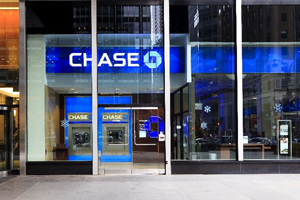Last Friday, the first wave of bank earnings reports hit Wall Street, when JPMorgan Chase & Co. (NYSE: JPM), Citigroup Inc. (NYSE: C), and scandal-stricken Wells Fargo & Co. (NYSE: WFC) released their first-quarter financials.
Now, ask any one random person in a "Man in the Street"-style interview what they'd expect of the "Too Big to Fail" banks' performance, and I'd bet you would get a shrug and hear something like, "I dunno - they probably made a ton of money, right?"
And that random person would be right... by about half. The big banks do make a ton of money, to be sure, but that's not the most important reason to sit up and pay attention.
That's right: Even if you don't own a single share, big bank earnings calls are a can't-miss event.
Listening to the big bank conference calls is like listening in on closed-door conversations with the U.S. financial industry's most powerful players.
These bankers not only control most of the economy's loans and deposits, but they also get a very clear picture each quarter of how individuals and businesses are faring and where they appear to be heading.
The calls are a road map, essentially, or a cheat sheet that can give you some dynamite investing ideas, not to mention precious intelligence on the state of the American economy.
That's why I never miss one - and you don't have to, either, because I'll let you in on what I heard...
[mmpazkzone name="in-story" network="9794" site="307044" id="137008" type="4"]
The Economy Gets a Solid "A"
While analysts and traders didn't seem to think much of the reports, I think they provided a pretty upbeat snapshot of the economy as it stands now.
At JPMorgan - hands-down the largest U.S. bank, with more than $2.5 billion in assets - loans grew by 8% overall. Consumer credit card sales and merchant transaction volumes were also up by double digits in the first three months of the year.
LIVE ON CAMERA: Watch America's No. 1 Trader officially become $1,050 richer in 15 seconds! His secret to becoming a multimillionaire is so easy that anybody can do it. Click here for details...
Over at Citigroup, the bank saw loan growth of 7%, and deposits grew by 5% last quarter. The volume of branded credit cards also grew by 6%.
That's where the growth stopped, though...
Wells Fargo, that golden goose turned Wall Street skunk, reported loan and deposit declines. That undoubtedly had less to do with the economy and more to do with the internal problems and tarnished reputation following the ongoing account scandal that's caused CEO John Stumpf to resign, ignited a federal investigation, and left millions of customers furious.
Despite all of that, one thing was clear from the round of earnings: Credit conditions remain outstanding.
Now, some analysts were quick to point out that credit card losses jumped about 20%... but neglected to mention that they were rising from historically low levels.
 Going through the reports, I saw nothing that indicates consumers or businesses were having a hard time paying off their loans. I like to keep tabs on credit cards and auto loans carefully, since that's where economic struggles first show up, but so far I do not see anything to keep me awake at night.
Going through the reports, I saw nothing that indicates consumers or businesses were having a hard time paying off their loans. I like to keep tabs on credit cards and auto loans carefully, since that's where economic struggles first show up, but so far I do not see anything to keep me awake at night.
But the banks released another piece of data that I believe is even more important than the actual reports.
Going through this data is like sitting in on the economic Joint Chiefs of Staff meeting. The data gives you access to the bankers that control the majority of loans and deposits nationwide...
And therefore, control a large bulk of the economy.
I'm talking about the earnings conference calls, where you get to hear the CEOs speaking freely about what's on their minds - which, in turn, offers plenty more valuable information to investors than the actual numbers.
How to Get the Most Out of the Big Bank Earnings
JPMorgan CEO Jamie Dimon remains pretty upbeat. He told shareholders in a press release that "The global economy continues to do well, and we remain optimistic about the positive impact of tax reform in the U.S. as business sentiment remains upbeat, and consumers benefit from job and wage growth."
The bank's CFO, Marianne Lake, was similarly positive, particularly regarding U.S. consumers. She told analysts, "I would say we still feel really good about the consumer, really good... confidence is high, and that should be a benefit generally speaking."
Stunning Video Footage: Watch this guy become $4,238 richer in under a minute – then follow his simple instructions to learn how you could pocket a potential $2,918 on just one move. Read more...
Then there was Citigroup boss Michael Corbat, who, honestly, sounded kind of like he's been reading my e-mails. He likes the robust economic environment but expressed concerns about geopolitics and increasing volatility.
He said on his call, "The environment remains unique, to say the least. We have synchronized global growth in a macroeconomic environment which is as positive as we've seen since before the financial crisis... and while our markets business may appreciate the volatility, we'd be better served by steady and predictable growth and having our fundamentally robust economy do its thing."
I want to make it clear that I do not own, nor do I expect to ever own, the big bank stocks.
Oh, I own a lot of banks, but they're so small that their average market cap would be nothing more than a rounding error on Jamie Dimon's paycheck. I do not care what the valuations are, or how the stocks are trading at any given moment in time.
The only reason I follow the big banks in the first place is because they control most of the U.S. banking system's loans and deposits. It's simple: If you want to know how American consumers and businesses are doing, just watch what they are doing with their money.
The big banks give us that 30,000-foot view of what the money is doing. Later this month, we'll be able to drill down a bit by considering the information that regional and community bankers tell us on their calls.
The first round of big bank releases and conference calls reveal an improving economy and a confident consumer. Consumers and businesses alike are borrowing and spending. Bills are still getting paid on a timely basis.
There are no signs (yet) of bankers being stupid to gain an extra 100 basis points of return, and that's excellent news for the economy as a whole.
This Easy-to-Follow Blueprint Could Make You $15,000 Richer
America’s #1 Trader used to be an average Joe scraping to get by. He never graduated from college, and he spent most of his career as a Home Depot customer service rep.
He didn't want to be stuck at a job he didn’t like until he was 80 – so he taught himself how to trade. He found he had a knack for it, and he became richer than he ever thought possible.
Then he invented his patent-pending Money Calendar, and he knew it could change people’s lives.
Now, for the first time ever, he’s revealing all his trading secrets and strategies – so you can amass a fast fortune for yourself.
Step by step, click by click, he’ll guide you through setting up your account – and show you how to set up a series of take-it-to-the-bank payouts of $605… $822… $1,190… $2,830 every single week.
There’s no guesswork involved, and the best part is – it’ll only take you 10 minutes per day! Click here now to start this once-in-a-lifetime journey…
Follow Money Morning on Facebook, Twitter, and LinkedIn.
About the Author
Tim Melvin is an unlikely investment expert by any measure. Raised in the "projects" of Baltimore by a single mother, he never attended college and started out as a door-to-door vacuum salesman. But he knew the real money was in the stock market, so he set sights on investing - and by sheer force of determination, he eventually became a financial advisor to millionaires. Today, after 30 years of managing money for some of the wealthiest people in the world, he draws on his experience to help investors find "unreasonably good" bargain stocks, multiply profits, and build their nest eggs. Tim tirelessly works to find overlooked "hidden gems" in the stock market, drawing on the research of legendary investors like Benjamin Graham, Walter Schloss, and Marty Whitman. He has written and lectured extensively on the markets, with work appearing on Benzinga, Real Money, Daily Speculations, and more. He has published several books in the "Little Book of" Investment Series and a "Junior Chamber Course" geared towards young adults that teaches Graham's principles and techniques to a new generation of investors. Today, he serves as the Special Situations Strategist at Money Morning and the editor of Peak Yield Investor.



